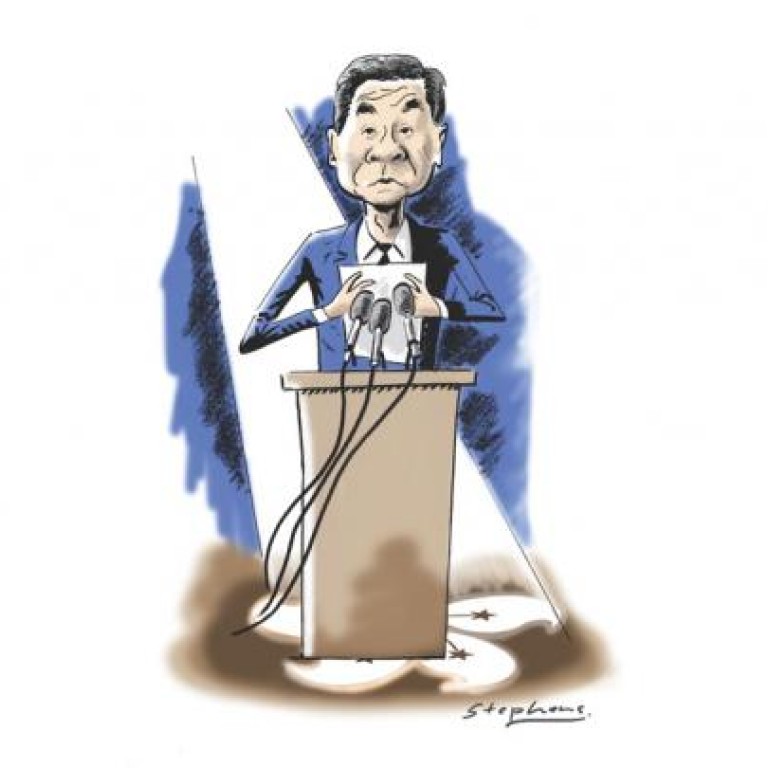
Policy address is Leung's last chance to show Hong Kong he can lead
Joseph Wong says the policy address may be Leung's last chance to prove he is fit to govern, and he will do best by focusing on achievable goals, rather than seemingly intractable problems
Responding to the massive protests on New Year's Day calling for Leung Chun-ying to step down, a government spokesman said the chief executive was concentrating on preparing his first policy address, working on various areas, including people's livelihood and the economy, addressing deep-rooted problems, and promoting stability in society. But will Leung succeed in convincing Hong Kong people that, despite his irreparable integrity problems, he is capable of leading them in the next five years?
When he delivers his first policy address on Wednesday, the one thing he will not talk about is his illegal structures. This could mean he will not deliberate on how to tackle the widespread illegal structures in the New Territories, which is one of the deep-rooted problems that need to be addressed.
Likewise, given the tensions between the pro- and anti-Leung camps, any message in the policy address aimed at promoting harmony in society will not be taken seriously.
But there is still a lot Leung can say that will have a positive effect on his governance. To start with, he can present a five-year government blueprint, putting forward concrete policy proposals based on his election manifesto. There will be long-term strategies, no doubt; but I would be very surprised if there were no handouts in various forms for the underprivileged sector of the community. Leung knows that the low-income, the less educated and the elderly are his most loyal and staunch supporters.
On a broader front, the vast majority of the people will watch carefully what Leung will say about their three major concerns: housing and property prices; the ageing population and retirement protection; and the environment.
On housing, Leung could fulfil his election promise to bring forward by one year the completion of about half of the 75,000 public rental flats already pledged by the previous administration. Beyond this, there is not much the Leung government can do to produce more public housing flats in the short term.
I am not sure what Leung will say regarding his promise to set aside more land to meet housing demand. What I am sure of is that finding new land in Hong Kong is not as easy as Leung suggested before he was elected.
I am also not confident that he and the unpopular Secretary for Development Paul Chan Mo-po can resolve the conflicts between groups of vested interests and start work on a plan to develop the northeastern New Territories.
As regards rising property prices, allowing more eligible applicants to buy second-hand Home Ownership Scheme flats without paying the land premium has had the unintended effect of lifting prices of small home to record levels. The imposition of a stamp duty targeted at foreign buyers drove down sales volume, but not the prices of the transactions. Leung should think carefully before announcing in his policy address the implementation details of his "Hong Kong property for Hong Kong residents" proposal.
Leung is keen to help those people living in "cage homes" and subdivided flats. There is a suggestion to provide them with better half-way accommodation, such as in old tenement buildings, before they move into public housing. But this may turn out to be another half-baked proposal fraught with implementation problems.
In short, on housing and property prices, I do not see Leung getting a high score.
Leung should do better on retirement protection for our ageing population, given that the previous administration had no long-term strategy to address the problem and also did little to help the elderly in the short term. While Leung has repeatedly stressed that the new Old Age Living Allowance is not the first step towards universal retirement protection, he knows full well that the Mandatory Provident Fund has proved to be inadequate.
The high management fees charged by the fund's trustees have been grossly unfair to working Hongkongers who contribute to the fund. Leung could win a lot of applause if he were to propose major and fundamental improvements to the MPF, such as by allowing the Monetary Authority (which manages the government's fiscal reserves with good results) to be a public trustee offering simple and low-cost investment services.
The government can also do more for the elderly in such areas as nursing homes, medical care and transport subsidies.
Improving the environment should be Leung's strongest hand. He has a professional team in Wong Kam-sing and Christine Loh Kung-wai, the secretary and undersecretary for the environment respectively. Leung's top priority should be to improve air quality and he has the advantage of leading a cash-rich government. Emissions from goods vehicles and franchised buses are the major polluters of our roadside air. The public would not be averse to the government offering more subsidies to the operators of these vehicles so they could upgrade to cleaner fleets within five years or less. This would help Leung make some friends in the middle class and the international community.
One other issue deserves a mention. While Leung is unlikely to propose in the policy address the arrangements for the 2016 Legislative Council election, with an eye to universal suffrage down the road, he would be wise to begin public consultation on this important subject.
People will not be content with a speech focusing only on the economy and livelihood issues, with no assurances on Hong Kong's journey towards full democracy and safeguarding our treasured core values of freedom, judicial independence and a high degree of autonomy.
I do not have high hopes that Leung can start afresh with one policy address. But I am certain that he will not have another opportunity to show the Hong Kong people that he is fit to govern for the next five years.
